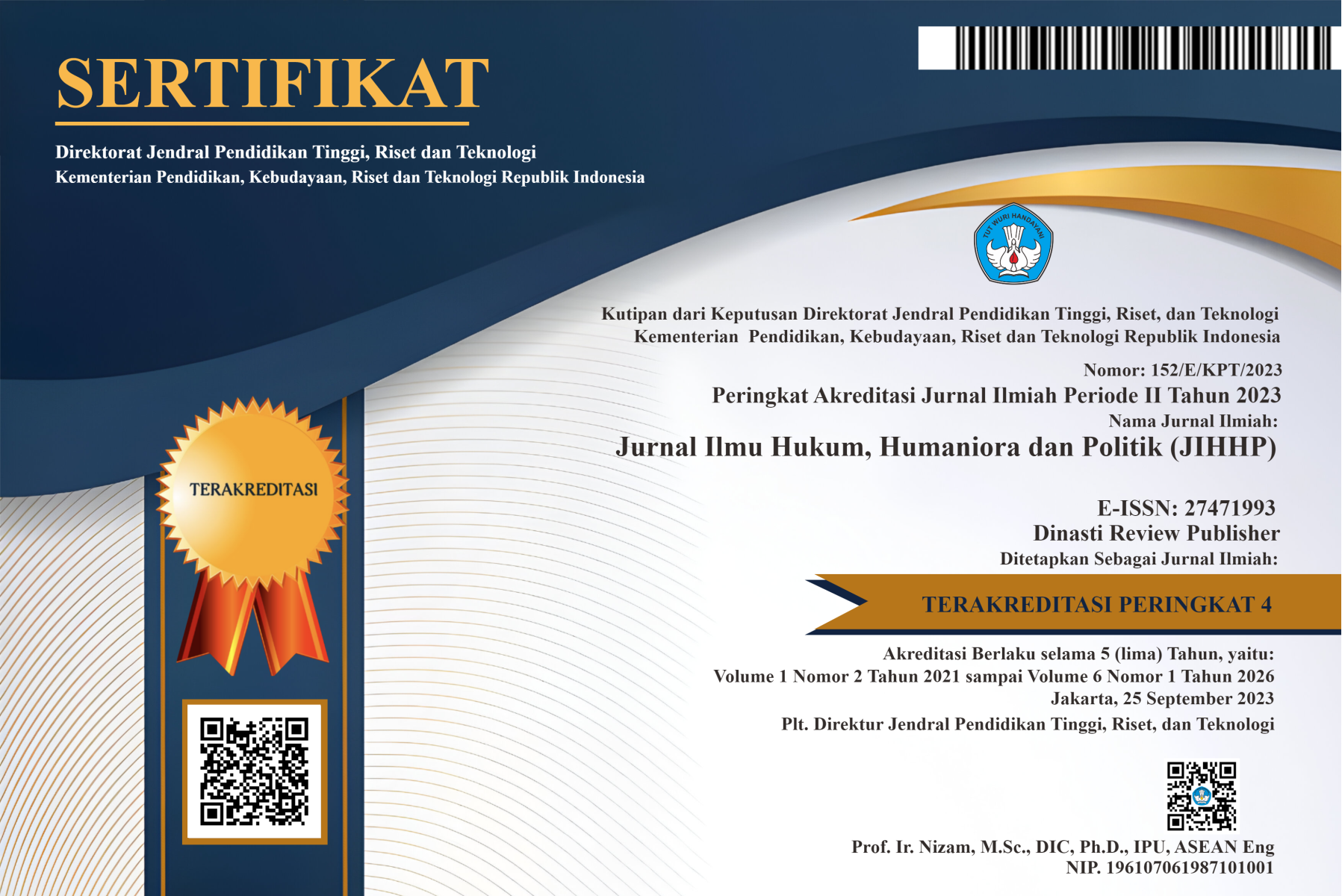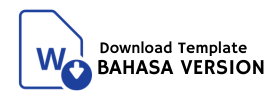Digital Leadership dalam Digital Governance untuk Pelayanan Publik Digital di Kota Tangerang
DOI:
https://doi.org/10.38035/jihhp.v5i1.3209Keywords:
Digital leadership, Digital governance, Public services, Tangerang LIVE, ApplicationAbstract
Tujuan penelitian ini adalah untuk mengetahui bagaimana digital leadership dalam digital governance untuk pelayanan publik digital di Kota Tangerang. Kota Tangerang memiliki super aplikasi Tangerang LIVE sebagai Super Apps layanan publik dengan 14 layanan dan 36 menu. Pemimpin digital bertanggung jawab untuk mengembangkan visi, strategi, dan kepemimpinan yang dibutuhkan untuk mengintegrasikan teknologi digital ke dalam proses pemerintahan. Teori yang digunakan dalam penelitian ini adalah kepemimpinan digital, digital governance serta pelayanan publik berbasis digital. Metode penelitian yang digunakan adalah metode penelitian campuran (mixed method) dengan pendekatan desain sekuensial penjelasan (explanatory sequential design). Pengolahan data dalam awal penelitian menggunakan pendekatan kuantitatif, analisis data melibatkan dua tahap utama. Pada tahap akhir penelitian yang menggunakan metode kualitatif, analisis data dilakukan dengan mencari, mengorganisir, dan menafsirkan informasi dari transkrip wawancara, catatan lapangan, dan sumber lainnya. Hasil penelitian menyebutkan bahwa baik secara parsial maupun secara simultan variabel kepemimpinan digital, digital governance mempunyai pengaruh terhadap pelayanan publik berbasis digital. Kepemimpinan digital merujuk pada kemampuan pemimpin untuk mengarahkan organisasi dalam mengadopsi teknologi baru yang dapat meningkatkan kualitas layanan, menciptakan visi digital yang jelas, dan menginspirasi pegawai untuk mengembangkan keterampilan digital yang diperlukan. Dengan memanfaatkan teknologi digital secara efektif, pemerintah dapat memenuhi harapan masyarakat yang semakin tinggi dan membangun sistem pelayanan publik yang adaptif dan berkelanjutan di era digital.
References
Aditya, T. (2023). Smart City Implementation: Analysis of Citizens’ Behavior Through Utilization of the “Tangerang-LIVE” Mobile Application to Improve Public Services during the Covid-19 Pandemic in Tangerang City. Jurnal Pembangunan Kota Tangerang, 1(1), 44–66. https://jurnal.tangerangkota.go.id/new/index.php/JPKT/article/view/14%0Ahttps://jurnal.tangerangkota.go.id/new/index.php/JPKT/article/download/14/4
Aditya, T., Ningrum, S., Nurasa, H., & Irawati, I. (2023). Community needs for the digital divide on the smart city policy. Heliyon, 9(8), e18932. https://doi.org/10.1016/j.heliyon.2023.e18932
AlAjmi, M. K. (2022). The impact of digital leadership on teachers’ technology integration during the COVID-19 pandemic in Kuwait. International Journal of Educational Research, 112(October 2021), 101928. https://doi.org/10.1016/j.ijer.2022.101928
Alif, N. N., & Sary, F. P. (2023). The Effect of Communication and Digital Leadership to Employee Performance in RSUD Brigjen H. Hasan Basry. Proceedings of the 5th European International Conference on Industrial Engineering and Operations Management, 1538–1547. https://doi.org/10.46254/eu05.20220298
AlNuaimi, B. K., Kumar Singh, S., Ren, S., Budhwar, P., & Vorobyev, D. (2022). Mastering digital transformation: The nexus between leadership, agility, and digital strategy. Journal of Business Research, 145(September 2021), 636–648. https://doi.org/10.1016/j.jbusres.2022.03.038
Antonopoulou, H., Halkiopoulos, C., Barlou, O., & Beligiannis, G. N. (2021a). Associations between traditional and digital leadership in academic environment: During the COVID-19 pandemic. Emerging Science Journal, 5(4), 405–428. https://doi.org/10.28991/esj-2021-01286
Antonopoulou, H., Halkiopoulos, C., Barlou, O., & Beligiannis, G. N. (2021b). Transformational leadership and digital skills in higher education institutes: During the covid-19 pandemic. Emerging Science Journal, 5(1), 1–15. https://doi.org/10.28991/esj-2021-01252
Aulia, R. (2019). Strategi Komunikasi Pemerintah Kota Tanggerang Via Aplikasi TAnggerang Live Dalam Menyampaikan Informasi Kepada Masyarakat Di Kota Tangerang. In Universitas Sultan Ageng Tirtayasa.
Baglama, B., Evcimen, E., Altinay, F., Sharma, R. C., Tlili, A., Altinay, Z., Dagli, G., Jemni, M., Shadiev, R., Yucesoy, Y., & Celebi, M. (2022). Analysis of Digital Leadership in School Management and Accessibility of Animation-Designed Game-Based Learning for Sustainability of Education for Children with Special Needs. Sustainability (Switzerland), 14(13). https://doi.org/10.3390/su14137730
Begeç, S., & Akyuz, G. A. (2023). Requirements of Collaborative and Transformational Leadership in Digital Ecosystem: techno-Orchestrating Leaders in A Vuca World. RAE Revista de Administracao de Empresas, 63(5), 1–30. http://dx.doi.org/10.1590/S0034-759020230505x%0Ahttps://www.scopus.com/record/display.uri?eid=2-s2.0-85169477838&origin=resultslist&sort=plf-f&src=s&sid=abcb96b434dd82027825853fb7df6380&sot=b&sdt=cl&cluster=scoexactkeywords%252C%2522Emotional+Intelligence
Benitez, J., Arenas, A., Castillo, A., & Esteves, J. (2022). Impact of digital leadership capability on innovation performance: The role of platform digitization capability. Information and Management, 59(2), 103590. https://doi.org/10.1016/j.im.2022.103590
Birch, K., Cochrane, D. T., & Ward, C. (2021). Data as asset? The measurement, governance, and valuation of digital personal data by Big Tech. Big Data and Society, 8(1). https://doi.org/10.1177/20539517211017308
Borah, P. S., Iqbal, S., & Akhtar, S. (2022). Linking social media usage and SME’s sustainable performance: The role of digital leadership and innovation capabilities. Technology in Society, 68(October 2021), 101900. https://doi.org/10.1016/j.techsoc.2022.101900
Carvalho, L. N. (2020). The Digital Leader: A Discussion on Five Capabilities for Navigating Ambiguity, Complexity and Uncertainty Luciano. SSRN Electronic Journal. https://doi.org/10.22581/muet1982.2003
Castro, C., & Lopes, C. (2022). Digital Government and Sustainable Development. Journal of the Knowledge Economy, 13(2), 880–903. https://doi.org/10.1007/s13132-021-00749-2
Chamakiotis, P., Panteli, N., & Davison, R. M. (2021). Reimagining e-leadership for reconfigured virtual teams due to Covid-19. International Journal of Information Management, 60(June), 102381. https://doi.org/10.1016/j.ijinfomgt.2021.102381
Chen, Y., Pereira, I., & Patel, P. C. (2021). Decentralized Governance of Digital Platforms. Journal of Management, 47(5), 1305–1337. https://doi.org/10.1177/0149206320916755
Corbett, F., & Spinello, E. (2020). Connectivism and leadership: harnessing a learning theory for the digital age to redefine leadership in the twenty-first century. Heliyon, 6(1), e03250. https://doi.org/10.1016/j.heliyon.2020.e03250
De Gregorio, G., & Radu, R. (2022). Digital constitutionalism in the new era of Internet governance. International Journal of Law and Information Technology, 30(1), 68–87. https://doi.org/10.1093/ijlit/eaac004
Dewi, R. K., & Sjabadhyni, B. (2021). Digital Leadership as a Resource to Enhance Managers’ Psychological Well-Being in COVID-19 Pandemic Situation in Indonesia. The South East Asian Journal of Management, 15(2). https://doi.org/10.21002/seam.v15i2.12915
Erkut, B. (2020). From digital government to digital governance: Are we there yet? Sustainability (Switzerland), 12(3), 1–13. https://doi.org/10.3390/su12030860
ERYE??L, K. (2021). Digital Leadership, Leadership Paradigm of the Digital Age: A Conceptual Framework. Equinox Journal of Economics Business and Political Studies, 8(1), 98–112. https://doi.org/10.48064/equinox.885320
Gaffley, G., & Pelser, T. G. (2021). Developing a digital transformation model to enhance the strategy development process for leadership in the South African manufacturing sector. South African Journal of Business Management, 52(1), 1–12. https://doi.org/10.4102/sajbm.v52i1.2357
Hafiza Hamzah, N., Khalid, M., & Wahab, J. A. (2021). The effects of principals’ digital leadership on teachers’ digital teaching during the covid-19 pandemic in malaysia. Journal of Education and E-Learning Research, 8(2), 216–221. https://doi.org/10.20448/journal.509.2021.82.216.221
Hamzah, S., Aditya, T., & El Yana, K. (2024). Pemanfaatan Saluran Whatsapp Terhadap Kepuasan Literasi Masyarakat Informasi di Kabupaten Tangerang. Jurnal JTIK (Jurnal Teknologi Informasi Dan Komunikasi), 8(3), 556–568. https://doi.org/10.35870/jtik.v8i3.2022
Janssen, M., Brous, P., Estevez, E., Barbosa, L. S., & Janowski, T. (2020). Data governance: Organizing data for trustworthy Artificial Intelligence. Government Information Quarterly, 37(3), 101493. https://doi.org/10.1016/j.giq.2020.101493
Karakose, T., Polat, H., & Papadakis, S. (2021). Exploring Teachers’ Perspectives on the Role of Digital Leadership in the COVID-19 Pandemic and Tech Skills of School Leaders. Sustainability, 13(23).
Karollah, B., Juned, V., Eliana, & Nurbismi. (2023). The Effect of Relation Between Digital Leadership and Learning Organization on the Individual Performance of SMEs. Journal of Law and Sustainable Development, 11(9), e1306. https://doi.org/10.55908/sdgs.v11i9.1306
Khaw, T. Y., Teoh, A. P., Abdul Khalid, S. N., & Letchmunan, S. (2022). The impact of digital leadership on sustainable performance: a systematic literature review. Journal of Management Development, 41(9–10), 514–534. https://doi.org/10.1108/JMD-03-2022-0070
Klein, M. (2020). Leadership Charateristics in The Era of Digital Transformation. Business & Management Studies: An International Journal, 8(1), 883–902.
Lander, J. (2020). The Relationship between Principals Pillars of Digital Leadership Alignment and Teacher Technology use.
Margetts, H. (2022). Rethinking AI for Good Governance. Daedalus, 151(2), 360–371. https://doi.org/10.1162/DAED_a_01922
Movahedi, B., Tan, R.-X., & Lavassani, K. M. (2011). Organizational development in Electronic Government adoption: A process development perspective. International Journal of Electronic Government Research, 7(1), 51–63. https://doi.org/10.4018/jegr.2011010104
Mulyana, R., Rusu, L., & Perjons, E. (2021). IT governance mechanisms influence on digital transformation: A systematic literature review. 27th Annual Americas Conference on Information Systems, AMCIS 2021, 0–10.
Navaridas-Nalda, F., Clavel-San Emeterio, M., Fernández-Ortiz, R., & Arias-Oliva, M. (2020). The strategic influence of school principal leadership in the digital transformation of schools. Computers in Human Behavior, 112(December 2019). https://doi.org/10.1016/j.chb.2020.106481
Niu, S. J., Park, B. Il, & Jung, J. S. (2022). The Effects of Digital Leadership and ESG Management on Organizational Innovation and Sustainability. Sustainability (Switzerland), 14(23). https://doi.org/10.3390/su142315639
Pane, I., Hadju, V. A., Maghfuroh, L., Akbar, H., Simamora, R. S., Lestari, Z. W., Galih, A. P., Wijayanto, P. W., Waluyo, Uslan, & Aulia, U. (2021). Desain Penelitian Mixed Method (Nanda Saputra (ed.); Pertama). Yayasan Penerbit Muhammad Zaini.
Picon, A. (2018). Urban Infrastructure, Imagination and Politics: from the Networked Metropolis to the Smart City. International Journal of Urban and Regional Research, 42(2), 263–275. https://doi.org/10.1111/1468-2427.12527
Porfírio, J. A., Carrilho, T., Felício, J. A., & Jardim, J. (2021). Leadership characteristics and digital transformation. Journal of Business Research, 124(June 2020), 610–619. https://doi.org/10.1016/j.jbusres.2020.10.058
Purwanto, A., Purba, J. T., Bernarto, I., & Sijabat, R. (2022). Peran Organizational Citizenship Behavior (OCB), Transformational and Digital Leadership Terhadap Kinerja Melalui Mediasi Komitmen Organisasi Pada Family Business ( The Role of Organizational Citizenship Behavior (OCB), Transformational and Digital Leader. SSRN Electronic Journal, 4(3), 256–272. https://doi.org/10.2139/ssrn.3987573
Rosyidah, I. N. (2017). Efektivitas Kmunikasi Humas Pemkot Tangerang dalam Implementasi Aplikasi “Tangerang LIVE.” Universitas Islam Negeri Syarif Hidayatullah.
Rumangkit, S., & Hadi, A. S. (2023). The role of digital leadership to improve innovation capabilities and TQM of MSMEs in Indonesia. Proceedings of the 3rd South American International Industrial Engineering and Operations Management Conference, Asuncion, 1667–1675. https://doi.org/10.46254/sa03.20220329
Salam, A. (2023). Navigating the Digital Landscape?: Exploring the Interplay of Digital Leadership , E- Learning Anxiety , and Innovative Behavior. Journal of Digitovation and Information System, 3(01), 32–46.
Schinagl, S., Shahim, A., Khapova, S., & van den Hooff, B. (2023). Digital security governance: What can we learn from high reliability organizations? Proceedings of the Annual Hawaii International Conference on System Sciences, 2023-Janua, 5938–5948.
Schiuma, G., Schettini, E., Santarsiero, F., & Carlucci, D. (2022). The transformative leadership compass: six competencies for digital transformation entrepreneurship. International Journal of Entrepreneurial Behaviour and Research, 28(5), 1273–1291. https://doi.org/10.1108/IJEBR-01-2021-0087
Setyawati, D. N., & Fitriati, R. (2023). Digital Governance in Information Disclosure. Jurnal Kebijakan Publik, 14(1), 48. https://doi.org/10.31258/jkp.v14i1.8217
Singh, P., Lynch, F., & Helfert, M. (2021). Role of Citizens in the Development of Smart Cities: Benefit of Citizen’s Feedback for Improving Quality of Service. International Conference on Smart Cities and Green ICT Systems, SMARTGREENS - Proceedings, 2021-April(Smartgreens), 45–56. https://doi.org/10.5220/0010442000350044
Srebalová, M., & Perá?ek, T. (2022). Effective Public Administration as a Tool for Building Smart Cities: The Experience of the Slovak Republic. Laws, 11(5), 1–16. https://doi.org/10.3390/laws11050067
Topcuoglu, E., Oktaysoy, O., Erdogan, S. U., Kaygin, E., & Karafakioglu, E. (2023). The Mediating Role of Job Security in the Impact of Digital Leadership on Job Satisfaction and Life Satisfaction. Marketing and Management of Innovations, 4511(1), 122–132.
Trencher, G. (2019). Towards the smart city 2.0: Empirical evidence of using smartness as a tool for tackling social challenges. Technological Forecasting and Social Change, 142(April), 117–128. https://doi.org/10.1016/j.techfore.2018.07.033
Verma, R., Bharti, U., & Tripathi, U. (2022). Digital Era and Its Impact on Leadership Transformation. Sachetas, 1(2), 36–41. https://doi.org/10.55955/120003
Warman, A., Affandi, M. J., Sukmawati, A., Maarif, M. S., Alfiany, H., & Hanifah, R. I. (2022). Digital Leadership: Develop Perceived organizational Support in The Perception of Talent Mobility at Employment Social Security Supervisory Agency. Jurnal Aplikasi Bisnis Dan Manajemen, 8(3), 769–778. https://doi.org/10.17358/jabm.8.3.769
Yang, K., Sunindijo, R. Y., & Wang, C. C. (2022). Identifying Leadership Competencies for Construction 4.0. Buildings, 12(9). https://doi.org/10.3390/buildings12091434
Yusuf, M., Satia, H. M. R., Bernardianto, R. B., Nur-Hasanah, N., Irwani, I., & Setyoko, P. I. (2023). Exploring the role of digital leadership and digital transformation on the performance of the public sector organizations. International Journal of Data and Network Science, 7(4), 1983–1990. https://doi.org/10.5267/j.ijdns.2023.6.014
Downloads
Published
How to Cite
Issue
Section
License
Copyright (c) 2024 Toddy Aditya ADITYA, Achmad Kosasih

This work is licensed under a Creative Commons Attribution 4.0 International License.
Hak cipta :
Penulis yang mempublikasikan manuskripnya di jurnal ini menyetujui ketentuan berikut:
- Hak cipta pada setiap artikel adalah milik penulis.
- Penulis mengakui bahwa Jurnal Ilmu Hukum, Humaniora dan Politik (JIHHP) berhak menjadi yang pertama menerbitkan dengan lisensi Creative Commons Attribution 4.0 International (Attribution 4.0 International CC BY 4.0) .
- Penulis dapat mengirimkan artikel secara terpisah, mengatur distribusi non-eksklusif manuskrip yang telah diterbitkan dalam jurnal ini ke versi lain (misalnya, dikirim ke repositori institusi penulis, publikasi ke dalam buku, dll.), dengan mengakui bahwa manuskrip telah diterbitkan pertama kali di JIHHP.















































